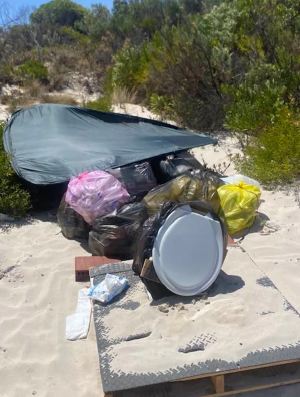Are You Next? How an Aussie Campsite's Beach Blunder Could Cost You $200!
- Replies 6
Australia's natural beauty is one of its greatest treasures, with pristine beaches and lush campgrounds drawing locals and tourists alike. But with the privilege of enjoying these wonders comes the responsibility to preserve them. The 'Leave No Trace' principle is a cornerstone of outdoor ethics in Australia, emphasizing the importance of keeping our public reserves and outdoor spaces clean and undisturbed. Despite this, littering and deliberate dumping continue to mar the landscape, posing a significant challenge for councils and authorities.
The latest incident to spark outrage occurred at a popular camping location along the Warroora Coast in Western Australia. A family left behind a disgraceful mess, including bags of rubbish, a deflated tent, and even a portable toilet lid, all abandoned on the sand. A witness took to Facebook to share the infuriating scene, noting that 'three or more cars' had been parked around the campsite before the group drove off, leaving their waste for someone else to deal with.
This act of environmental disrespect has left many campers and locals fuming, with some going as far as labeling the offenders 'scum.' The frustration is palpable among the Australian community, especially when such behavior tarnishes the reputation of responsible campers and threatens the closure of beloved free camping sites.

The Department of Biodiversity, Conservation and Attractions (DBCA) in Western Australia told Yahoo News Australia that rubbish disposal and dumping are ongoing challenges across the state. The DBCA, along with local governments and organizations like Keep Australia Beautiful WA, promotes the 'Leave No Trace' principles and encourages park users and campers to take their waste with them and dispose of it properly at home.
Most state parks and campsites are equipped with waste disposal facilities, yet some visitors still choose to ignore these amenities. The consequences for littering in national parks and marine parks are not insignificant, with fines starting at $200 and reaching up to a maximum penalty of $2,000.
In response to the recent incident, locals took it upon themselves to clean up the mess. This act of community spirit, while commendable, should not be necessary. Campers and visitors must be held accountable for their actions, and some have suggested that rangers should increase their patrols and monitoring of beach areas and campsites to deter potential litterbugs.
Rubbish dumping is not a localized issue; it's a widespread problem that has frustrated many Australians nationwide. From the Murray River in Victoria to the remote campgrounds and 4WD tracks of Western Australia, the evidence of neglect is clear. One grey nomad, traveling with his wife in their campervan, lamented the increase in rubbish they've encountered compared to 20 years ago.
As members of the Seniors Discount Club, we cherish our travels and the opportunity to explore Australia's unique environment. It's up to each of us to lead by example, ensuring that we leave no trace of our presence in the natural areas we visit. By doing so, we not only protect the environment but also preserve the right to enjoy these spaces for future generations.
We encourage all our readers to be vigilant and proactive in maintaining the cleanliness of our campsites and beaches. If you witness littering or illegal dumping, report it to the local authorities. And remember, the next time you pack up your campsite, make sure you're not leaving behind anything but footprints – because the cost of negligence is not just a $200 fine, it's the degradation of the very beauty we seek to enjoy.
 Have you encountered similar issues on your travels? How do you ensure that you 'Leave No Trace' when camping or enjoying the outdoors? Share your experiences and tips in the comments below, and let's work together to keep Australia beautiful.
Have you encountered similar issues on your travels? How do you ensure that you 'Leave No Trace' when camping or enjoying the outdoors? Share your experiences and tips in the comments below, and let's work together to keep Australia beautiful.
The latest incident to spark outrage occurred at a popular camping location along the Warroora Coast in Western Australia. A family left behind a disgraceful mess, including bags of rubbish, a deflated tent, and even a portable toilet lid, all abandoned on the sand. A witness took to Facebook to share the infuriating scene, noting that 'three or more cars' had been parked around the campsite before the group drove off, leaving their waste for someone else to deal with.
This act of environmental disrespect has left many campers and locals fuming, with some going as far as labeling the offenders 'scum.' The frustration is palpable among the Australian community, especially when such behavior tarnishes the reputation of responsible campers and threatens the closure of beloved free camping sites.

Tourists at a popular Warroora Coast camping spot in Western Australia have been criticised for leaving behind bags of waste and camping equipment. Credit: Facebook
The Department of Biodiversity, Conservation and Attractions (DBCA) in Western Australia told Yahoo News Australia that rubbish disposal and dumping are ongoing challenges across the state. The DBCA, along with local governments and organizations like Keep Australia Beautiful WA, promotes the 'Leave No Trace' principles and encourages park users and campers to take their waste with them and dispose of it properly at home.
Most state parks and campsites are equipped with waste disposal facilities, yet some visitors still choose to ignore these amenities. The consequences for littering in national parks and marine parks are not insignificant, with fines starting at $200 and reaching up to a maximum penalty of $2,000.
In response to the recent incident, locals took it upon themselves to clean up the mess. This act of community spirit, while commendable, should not be necessary. Campers and visitors must be held accountable for their actions, and some have suggested that rangers should increase their patrols and monitoring of beach areas and campsites to deter potential litterbugs.
Rubbish dumping is not a localized issue; it's a widespread problem that has frustrated many Australians nationwide. From the Murray River in Victoria to the remote campgrounds and 4WD tracks of Western Australia, the evidence of neglect is clear. One grey nomad, traveling with his wife in their campervan, lamented the increase in rubbish they've encountered compared to 20 years ago.
As members of the Seniors Discount Club, we cherish our travels and the opportunity to explore Australia's unique environment. It's up to each of us to lead by example, ensuring that we leave no trace of our presence in the natural areas we visit. By doing so, we not only protect the environment but also preserve the right to enjoy these spaces for future generations.
We encourage all our readers to be vigilant and proactive in maintaining the cleanliness of our campsites and beaches. If you witness littering or illegal dumping, report it to the local authorities. And remember, the next time you pack up your campsite, make sure you're not leaving behind anything but footprints – because the cost of negligence is not just a $200 fine, it's the degradation of the very beauty we seek to enjoy.
Key Takeaways
- Tourists at a popular Warroora Coast camping location in Western Australia have been criticised for leaving behind a significant amount of rubbish, including bags of waste and camping equipment.
- The Department of Biodiversity, Conservation and Attractions (DBCA) promotes 'Leave No Trace' principles and works with local governments and organisations to address the challenge of rubbish disposal and dumping.
- The fine for littering in national and marine parks in Western Australia is $200, with a maximum penalty of $2,000.
- The littering issue has frustrated many Australians and risks leading to the closure of free camping sites, as well as creating a negative reputation for full-time travellers.







